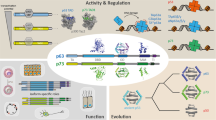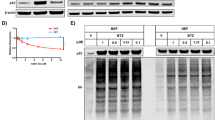Abstract
The p53 tumor suppressor orchestrates a number of important genes involved in cell-cycle control and apoptosis. Mice deficient for p53 show a high incidence of cancer but are developmentally normal suggesting that compensatory mechanisms exist in embryogenesis and differentiation. The new KET protein is the first mammalian protein with strong homology to p53 in all evolutionary conserved regions. This conservation makes a functional redundancy of the two proteins in cell-cycle control possible. KET is expressed during embryonic development and in certain adult tissues. Among all of the known p53 proteins of different species KET is most closely related to that found in squid. The relationship between KET and the invertebrate p53 protein sheds light on the evolutionary origin of p53. KET appears to be an ancestral p53-related protein in vertebrates with a possible role in development and differentiation while the ubiquitously expressed p53 protein attained its general role as `guardian of the genome' during evolution.
This is a preview of subscription content, access via your institution
Access options
Subscribe to this journal
Receive 50 print issues and online access
$259.00 per year
only $5.18 per issue
Buy this article
- Purchase on Springer Link
- Instant access to full article PDF
Prices may be subject to local taxes which are calculated during checkout
Similar content being viewed by others
Author information
Authors and Affiliations
Rights and permissions
About this article
Cite this article
Schmale, H., Bamberger, C. A novel protein with strong homology to the tumor suppressor p53. Oncogene 15, 1363–1367 (1997). https://doi.org/10.1038/sj.onc.1201500
Received:
Accepted:
Issue Date:
DOI: https://doi.org/10.1038/sj.onc.1201500
Keywords
This article is cited by
-
DNA damage response revisited: the p53 family and its regulators provide endless cancer therapy opportunities
Experimental & Molecular Medicine (2022)
-
Structural diversity of p63 and p73 isoforms
Cell Death & Differentiation (2022)
-
Tissue-specific expression of p73 and p63 isoforms in human tissues
Cell Death & Disease (2021)
-
Expression of p53, p63, podoplanin and Ki-67 in recurring versus non-recurring oral leukoplakia
Scientific Reports (2021)
-
ΔNp63 transcript loss in bladder cancer constitutes an independent molecular predictor of TaT1 patients post-treatment relapse and progression
Journal of Cancer Research and Clinical Oncology (2019)



